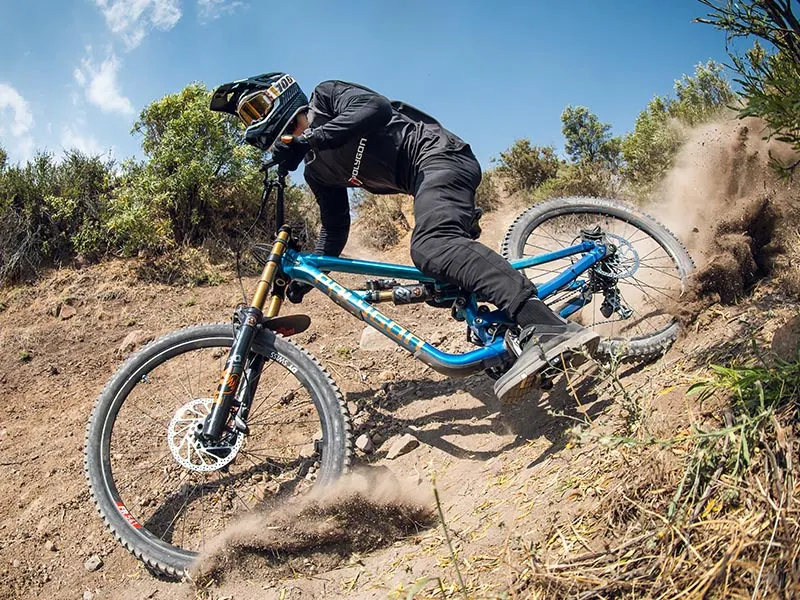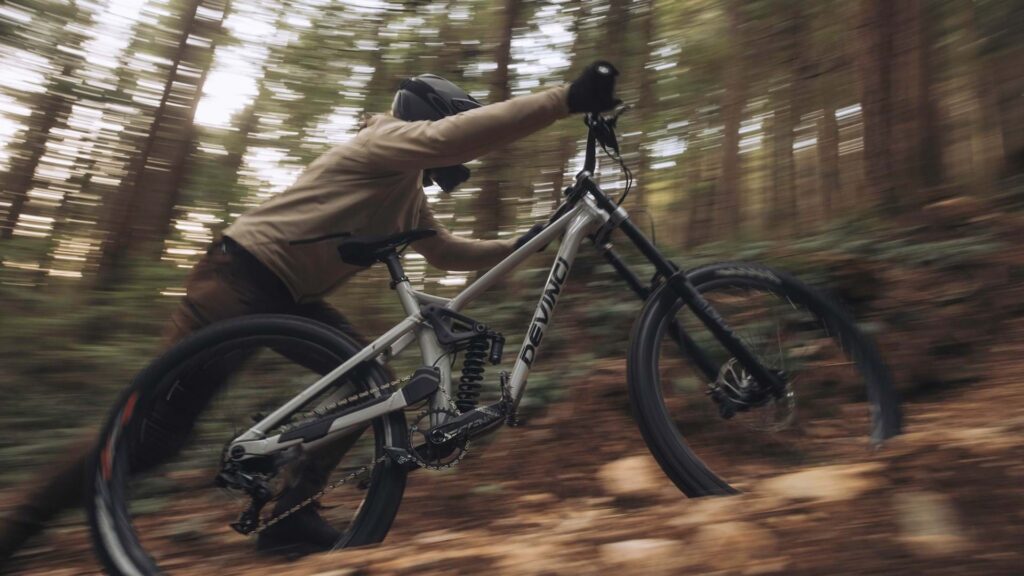Polygon is one of those brands that people often underestimate—until they ride one. For years, it’s been quietly building bikes that punch well above their price point, backed by serious manufacturing muscle and a growing presence in global racing. While many riders still associate Polygon with “value,” that label doesn’t tell the full story anymore.
Based in Indonesia and vertically integrated in a way most bike brands can only dream of, Polygon controls nearly every step of its production process. Frames aren’t just designed in-house—they’re manufactured in-house, painted in-house, and assembled in-house. That scale gives Polygon a unique advantage: it can offer modern geometry, carbon frames, and solid components at prices that would be difficult for traditional Western brands to match.
By 2026, Polygon has matured from a budget-friendly alternative into a legitimate performance brand, particularly in mountain biking and gravity disciplines. The bikes are no longer just “good for the money”—many are simply good, full stop.
This is a look at Polygon’s background, how they design bikes, what the current lineup looks like, and who Polygon really makes sense for today.
The Polygon Story
Built From the Factory Up
Polygon is owned by PT Insera Sena, one of the largest bicycle manufacturers in the world. Unlike brands that outsource frame production to third-party factories, Polygon operates its own manufacturing facilities in Indonesia—some of the most advanced in the industry.
That matters more than most people realize.
Because Polygon controls tooling, carbon layups, welding, paint, and assembly, they’re not just slapping their logo on generic frames. They’re able to iterate faster, manage costs more effectively, and ensure consistency across models.
While many brands rely on overseas factories, Polygon is the factory.
Early Reputation: Value-Focused, Performance-Adjacent
In its early international presence, Polygon gained traction as a value brand—especially through direct-to-consumer channels and partnerships with retailers like Bikes Online. Riders saw modern-looking bikes with respectable geometry and good components at prices hundreds or even thousands less than competitors.
At first, Polygon bikes were often framed as “great for beginners” or “good if you’re on a budget.” But that perception started shifting as Polygon invested more heavily in engineering, testing, and race programs.
Racing Changes Perception
Polygon’s involvement in downhill and enduro racing has had a real impact on how the brand is viewed. The Polygon UR team, competing at World Cup DH events, put the bikes under elite riders on the most demanding tracks in the world.
That exposure wasn’t just marketing—it fed directly into bike development. Geometry updates, suspension refinements, and frame durability improvements came straight from race feedback.
By the mid-2020s, it was clear Polygon wasn’t just making affordable bikes. They were making serious bikes at accessible prices.
Design Philosophy
Polygon’s approach is pragmatic, not romantic. The brand isn’t trying to sell mystique or heritage. It’s trying to deliver performance per dollar, without cutting corners that actually matter.
Engineering Over Storytelling
Polygon doesn’t lean heavily on lifestyle branding. Instead, the focus is on:
- geometry numbers that make sense
- suspension designs that work
- frames that are durable and consistent
- components that match the bike’s intent
The goal isn’t to reinvent categories—it’s to execute them well.
Modern Geometry, Sensible Extremes
Polygon bikes generally follow modern geometry trends:
- longer reach
- slacker head angles
- steeper seat tubes
But they stop short of the most extreme numbers. The bikes are designed to be stable and confidence-inspiring without becoming cumbersome for average riders.
This makes them approachable for a wide range of skill levels.
Carbon and Alloy Done at Scale
Because Polygon controls manufacturing, they’re able to offer carbon frames at prices that undercut much of the competition. But they also maintain strong aluminum offerings that don’t feel like compromises.
The alloy frames are often heavier, yes—but they’re durable, well-finished, and well-designed.
The 2026 Polygon Lineup
Polygon’s catalog is broad, but it’s organized logically. Here’s how the key categories shake out.
Siskiu Series (Trail / All-Mountain)
The Siskiu line is Polygon’s bread and butter.
Key models:
- Siskiu T (trail-focused)
- Siskiu D (downhill/enduro-focused)
- Siskiu N (long-travel all-mountain)
These bikes are known for:
- modern trail geometry
- Horst-link suspension layouts
- good pedaling efficiency
- solid downhill confidence
The Siskiu T is especially popular as a do-it-all trail bike. It’s not flashy, but it’s dependable and fun.
Best for:
- riders upgrading from hardtails
- trail riders who want modern geometry without boutique pricing
- riders who want value without sacrificing capability
Collosus Series (Enduro / Downhill)
This is where Polygon’s racing influence is most visible.
Key traits:
- long travel
- aggressive geometry
- gravity-first mindset
The Collosus DH and enduro platforms are designed for speed, stability, and durability. They’re heavier than some competitors, but they’re also incredibly planted and forgiving.
These bikes don’t feel nervous. They feel composed when things get steep and fast.
Best for:
- park riders
- enduro racers on a budget
- riders who prioritize stability over weight
Xtrada & Syncline (Hardtail / XC)
Polygon’s hardtails offer strong value and sensible geometry.
- Xtrada: aluminum hardtail, entry-to-mid-level trail riding
- Syncline: carbon XC hardtail, race-oriented
The Syncline, in particular, surprises people. It’s light, efficient, and competitive in XC settings, especially considering its price.
Best for:
- XC racers on a budget
- riders wanting a fast, simple bike
- endurance-focused riders
Bend Series (Urban / Gravel)
Polygon also has a growing presence in gravel and urban riding, though it’s not the brand’s core identity.
The Bend gravel bikes are straightforward:
- carbon or alloy options
- endurance-focused geometry
- practical component choices
They’re not trying to out-aero premium gravel race bikes. They’re built to be reliable and accessible.
Polygon E-Bikes
Polygon’s e-bike lineup continues to expand, primarily using Bosch and Shimano motor systems.
The focus remains on:
- trail and all-mountain e-MTBs
- sensible power delivery
- competitive pricing
They don’t chase massive batteries or extreme torque figures. Instead, the goal is balanced handling and reasonable range.
Ride Quality
Climbing
Polygon bikes generally climb better than their weight would suggest. Suspension designs are efficient, and seat tube angles are steep enough to keep riders centered over the pedals.
They’re not XC rockets, but they don’t feel like anchors either.
Descending
Descending is where Polygon shines—especially in trail and gravity categories.
The bikes feel:
- stable
- predictable
- forgiving
They encourage riders to push without punishing small mistakes.
Handling
Handling is neutral. Bikes respond well to rider input without demanding constant correction. This makes them especially appealing to intermediate riders progressing into more technical terrain.
Comfort
Suspension tuning favors traction and support over harshness. Combined with slightly conservative stiffness, this leads to a comfortable ride on longer days.
Durability and Ownership
Polygon bikes have a reputation for being tough.
- frames are overbuilt rather than underbuilt
- paint and finishes hold up well
- hardware is standard and replaceable
Customer support varies by region and retailer, but overall reliability is strong—especially given the price point.
Pricing and Value
This is where Polygon still stands apart.
In 2026, typical pricing looks like:
- Trail bikes: $2,000–$3,500
- Carbon trail/enduro: $3,000–$5,000
- Downhill bikes: $3,500–$5,500
You’re often getting:
- carbon frames at alloy prices
- modern geometry without markup
- solid components instead of flashy branding
Polygon remains one of the strongest value propositions in mountain biking.
Who Polygon Is For
Polygon is a great fit for riders who:
- want modern performance without premium pricing
- are progressing and want room to grow
- value function over brand prestige
- ride real trails, not parking lot loops
Less ideal if you:
- want boutique-level finish and exclusivity
- prioritize brand heritage
- want the absolute lightest build
How Polygon Compares
- vs. Trek / Specialized: less expensive, fewer lifestyle touches, more value-driven
- vs. Canyon: similar value, but Polygon feels more conservative and durable
- vs. Marin: Polygon offers more aggressive geometry in many categories
- vs. Santa Cruz / Yeti: not as refined, but dramatically cheaper
Polygon’s advantage is simple: it delivers real performance without inflated pricing.
Closing Thoughts on Polygon
Polygon doesn’t try to be something it’s not. It doesn’t sell nostalgia, mystique, or exclusivity. It sells bikes that work—built by people who actually control how those bikes are made.
For riders who care about trail performance more than brand cachet, Polygon continues to be one of the smartest buys in the industry.
It’s no longer just the “budget option.” It’s a legitimate performance brand that happens to cost less.
And for a lot of riders in 2026, that’s exactly what matters.
Related Content:
- Diamondback Bikes Review
- Best Mountain Bike Brands
- Trek vs Specialized
- Schwinn Bikes Review
- How To True a Wheel
Why Trust This Review?
BestBikeBrands is built by lifelong cyclists with decades of real-world experience — in the shop, on the trail, and behind the wrench. Our goal is simple: to help riders choose the best bikes and gear with confidence, backed by expert insights and hands-on testing. Learn more about us →






